Arizona State University
School of Music, Dance and Theatre presents
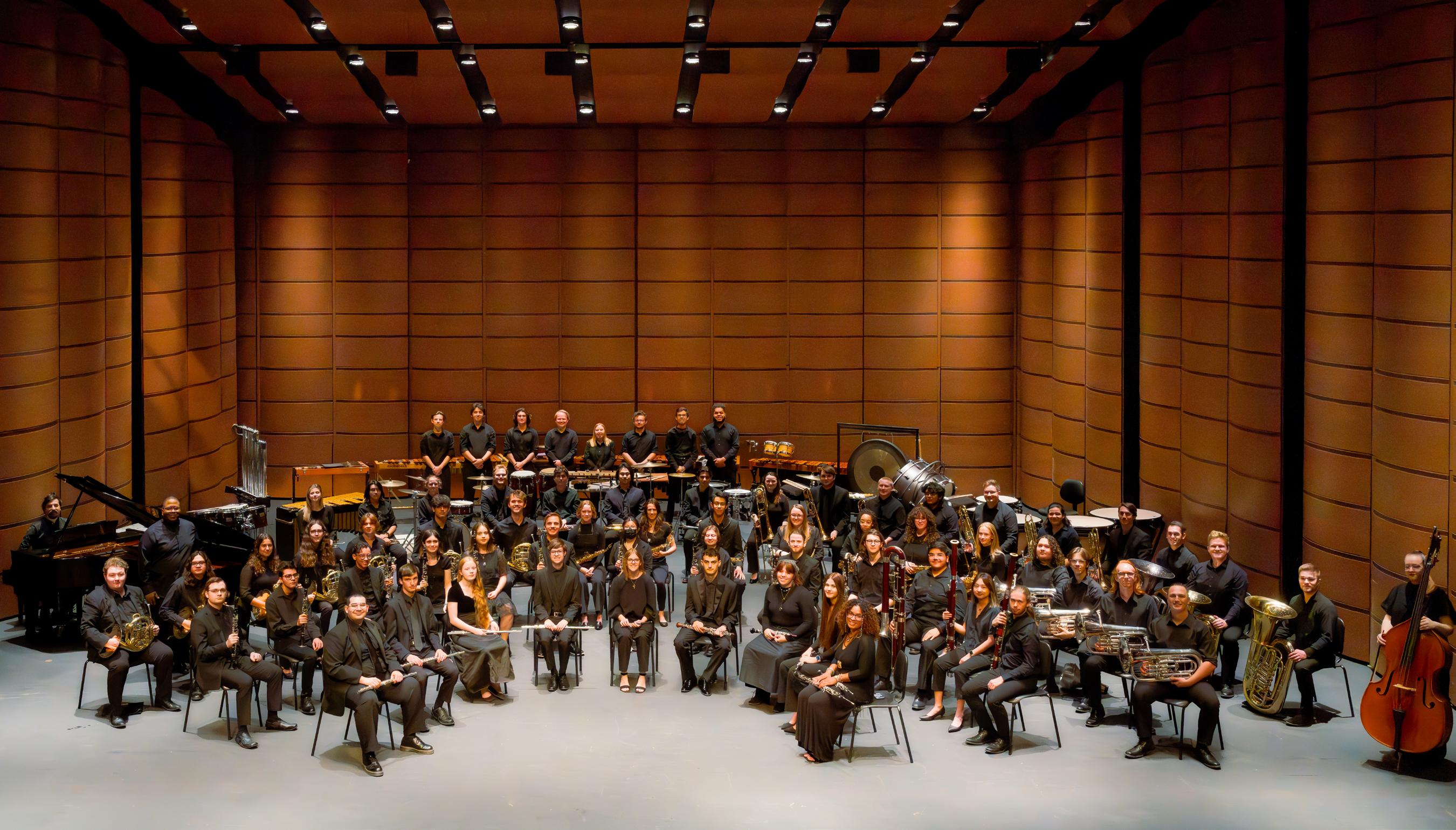
Wind Symphony
Jamal Duncan, Conductor
Jason Caslor, Guest Conductor
Jaxon Castro, Composer-In-Residence
LOTUS Quartet
GianCarlo Lay, Soprano Saxophone
Johnathan Lee, Alto Saxophone
Keegan Ewan, Tenor Saxophone
Jerick Meagher, Baritone Saxophone
CBDNA Western/Northwestern Divisions Conference
Friday, March 29, 2024
Las Vegas Academy for the Arts
Lowden Theater
2:45 p.m.

ASU acknowledges the twenty-three Native Nations that have inhabited our land for centuries. Arizona State University’s four campuses are located in the Salt River Valley on ancestral territories of Indigenous peoples, including the Akimel O’odham (Pima) and Pee Posh (Maricopa) Indian Communities, whose care and keeping of these lands allows us to be here today. We recognize the sovereignty of these nations and seek to foster an environment of success and possibility for Native American students, staff, faculty, and patrons.
We also recognize that this performance takes place upon the sacred ancestral land of the Nuwu - Southern Paiute, Wa She Shu - Washoe, Numu - Northern Paiute, Nuwe - Western Shoshone, Hualapai, and Chemehuevi; people who live and thrive all around the state of Nevada. We also highlight and uplift all of Nevada’s 27 sovereign tribal nations.
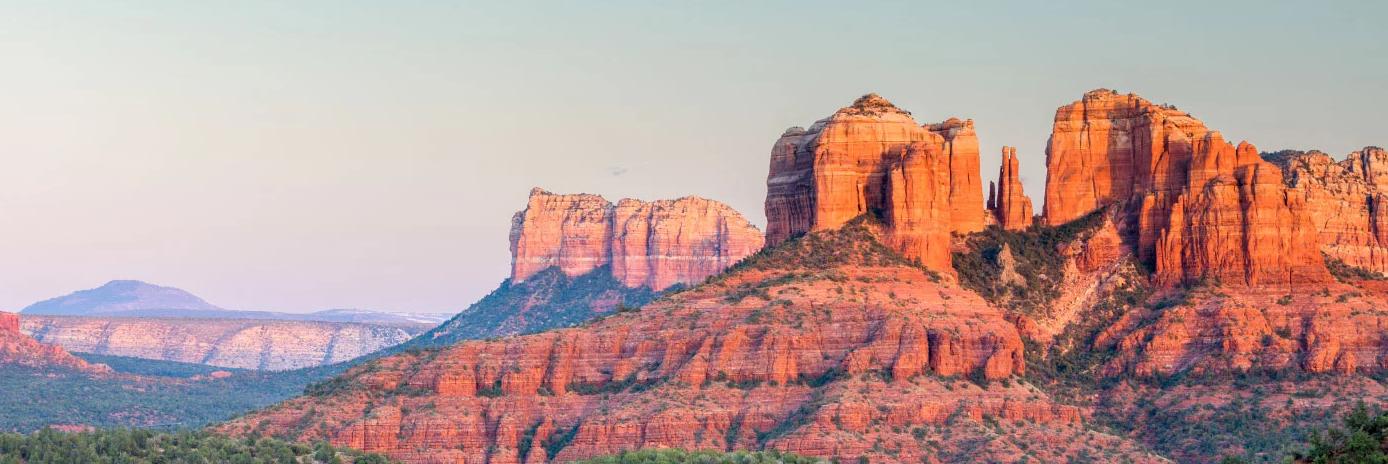



ASUMusicDanceTheatre ASU_MDT musicdancetheatre.asu.edu Music 480-965-3371 Dance and Theatre 480-965-5337
Land Acknowledgement
Conductor’s Message
Jamal Duncan
I am honored to present this program to you this afternoon. The collaborative journey that the Wind Symphony and I have undertaken preparing this repertoire has been very rewarding.

While the 72 members of the ASU Wind Symphony are predominantly music majors, approximately 15% of the ensemble are future engineers, scientists, medical professionals, technology leaders, economists, urban planners and business specialists.
Today’s program brings together works that are important to me, and that also speak to the relationship between composer, ensemble, and conductor.
I heard Kevin Day’s music for the first time at the 2019 National Conference in my soon-to-be home of Tempe, Arizona. I was immediately captivated by the energy and excitement that characterizes much of Kevin’s music. When I moved to Tempe and we were doing “zoom classes” I invited Kevin to talk with the wind symphony about his music. After that session, I knew I wanted to commission a piece from Kevin. Luckily, logistics aligned and he was able to be the first composer that I commissioned at ASU.
Steven Bryant’s Nothing Gold Can Stay was a gift from my friends and I to celebrate Dr. Kevin L. Sedatole’s tenth anniversary at Michigan State University. The commission came together in about one hour in the lobby of the conference hotel for the 2015 conference in Nashville. It was at the 2009 CBDNA in Austin that I was first was introduced to Steven’s music through his Ecstatic Waters and since then I have been an admirer of his. We dedicate today’s performance of Nothing Gold Can Stay to past CBDNA President Glen Adsit.
Viet Cuong’s Second Nature is joy-filled dance music that celebrates the saxophone quartet. Viet’s music teems with joy and vitality; I know you are going to enjoy the piece and the LOTUS Quartet’s dynamic performance.



ASUMusicDanceTheatre ASU_MDT musicdancetheatre.asu.edu Music 480-965-3371 Dance and Theatre 480-965-5337
Jaxon Castro, a BM in Composition student and a hornist in the ASU Wind Symphony, is this year’s Wind Symphony Composer-In-Residence. Established in 2021, the ASU Wind Bands Composer-In-Residence Program is designed to give ASU composition students a year-long opportunity to fully immerse themselves in writing a new work for concert band. The program has now grown to include ASU Orchestras and ASU Chamber Winds. Included in these collaborations is the opportunity to create, workshop, rehearse, record, and possibly premiere a new work. Viewed as a true collaborative effort, we see the composer, conductor, and ensemble members as equal partners in this venture. Under the tutelage of his professor, Daniel Bernard Roumain, Jaxon has composed an energetic piece that channels his love for electronic dance music (EDM.)
I have enjoyed Michael Daugherty’s music since I was an undergraduate at the University of Michigan. I am drawn to the way his music displays his love for American history and poular culture in such a dynamic way. What better way to end our concert than by celebrating Las Vegas of yesteryear with the students who will shape tomorrow?
On behalf of myself and the ASU Wind Symphony, we hope you enjoy this afternoon’s performance.





ASUMusicDanceTheatre ASU_MDT musicdancetheatre.asu.edu Music 480-965-3371 Dance and Theatre 480-965-5337
From the Dean
Steven Tepper
The Herberger Institute at Arizona State University is a design and arts college that prioritizes both excellence and access, situated at one of the best global research universities in the world. Comprising six schools and two museums, the Institute is a creative body of more than 8,000 students and 750 faculty members spread over four cities and two states, and the School of Music, Dance and Theatre is our beating heart.

We are fortunate to have Dr. Heather Landes as director of the school, and Dr. Jamal Duncan as associate director of bands and assistant professor of instrumental conducting. As evidenced by the thoughtful program you will hear today from ASU’s Wind Symphony, Dr. Duncan is deeply committed to programming music that tells the stories of different cultures; he is also actively involved in the commissioning of new works from established and emerging composers.
Dr. Duncan and the ASU Wind Symphony exemplify the spirit of the Institute. I am proud to have them represent us here in Las Vegas, and I extend my heartfelt congratulations to all involved.
Steven Tepper Dean and Director
The Herberger Institute for Design and the Arts at Arizona State University
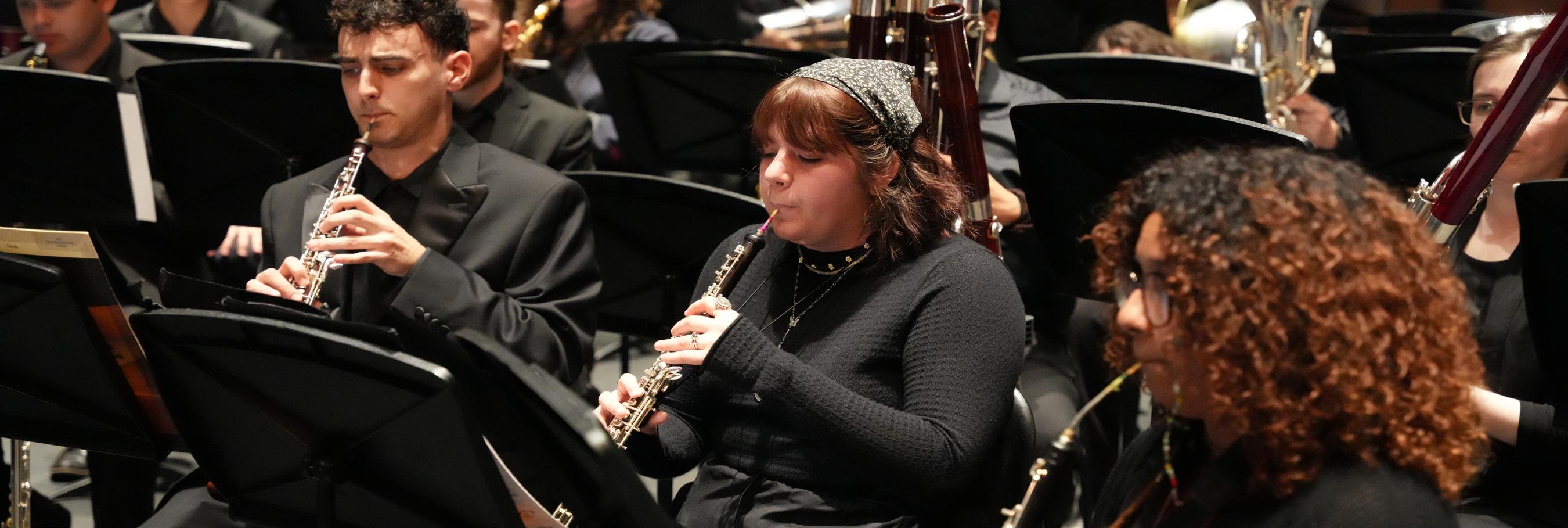



ASUMusicDanceTheatre ASU_MDT musicdancetheatre.asu.edu Music 480-965-3371 Dance and Theatre 480-965-5337
From the Director
Heather Landes
The Arizona State University School of Music, Dance and Theatre is honored to be part of the 2024 Western and Northwestern Divisions Conference of the College Band Directors National Association in Las Vegas, NV. We hope that everyone in attendance leaves refreshed and energized with new knowledge and inspiration.
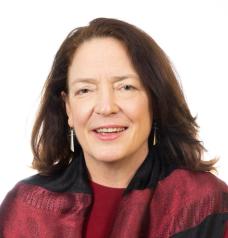
Collectively, the ASU School of Music, Dance and Theatre is a community of learners — artists, educators, scholars, practitioners and activists — committed to ethical and equitable engagement in music, dance and theatre. We attract talented musicians from all over the world who bring a thirst for music, high performing standards and a drive for excellence and inclusion that helps create an environment where all students can excel and, at the same time, pursue their own individual passion and course of study. Our internationally renowned faculty, outstanding facilities, and innovative and collaborative programs all contribute to motivate and empower students to become the next generation of creative leaders.
Through more than 35 undergraduate and graduate music degrees and three undergraduate music minors, and certificate programs in music entrepreneurship and music theory pedagogy, the ASU School of Music, Dance and Theatre engages students with a broad range of musical thought, expression and experiences. Students can achieve anything they want here and be a part of a major research university that also nurtures, values and encourages creativity. We invite you to visit musicdancetheatre.asu.edu or schedule an on-campus visit to learn about the many opportunities available to students in the ASU School of Music, Dance and Theatre. We welcome your interest in studying at ASU.
We would like to take this opportunity to commend Dr. Jamal Duncan, associate director of bands, assistant director of undergraduate studies and assistant



ASUMusicDanceTheatre ASU_MDT musicdancetheatre.asu.edu Music 480-965-3371 Dance and Theatre 480-965-5337
professor, for the countless hours he has spent planning and preparing for the ASU Wind Symphony’s appearance at the conference, and to our dedicated students who have worked diligently on the music they are performing for you today.
Thank you for attending our concert today, and we hope that this is a memorable week filled with breathtaking performances and world premieres, groundbreaking presentations and forums.
With Gratitude,
Heather Landes, Director
ASU School of Music, Dance and Theatre




ASUMusicDanceTheatre ASU_MDT musicdancetheatre.asu.edu Music 480-965-3371 Dance and Theatre 480-965-5337
Program
ASU Wind Symphony
Jamal Duncan, Conductor
Lightning Round (2022)..........................................................................Kevin Day (b. 1996) 4’
Jason Caslor, Guest Conductor
Nothing Gold Can Stay (2016).......................................................Steven Bryant (b. 1972) 7’
In Memory of Glen Adsit
Second Nature (2023)...........................................................................Viet Cuong (b. 1990) 16’
I. Part 1
II. Part 2
III. Part 3
LOTUS Quartet Consortium Premiere
Critical Error (2023)............................................................................Jaxon Castro (b. 2002) 4’
I. System Restart
World Premiere
Lost Vegas (2011)....................................................................Michael Daugherty (b. 1954) 15’
I. Viva
II. Mirage
III. Fever



ASUMusicDanceTheatre ASU_MDT musicdancetheatre.asu.edu Music 480-965-3371 Dance and Theatre 480-965-5337
Wind Symphony
Flutes/Piccolo
*Blake Allen, Phoenix
Abby Berg, Fargo, ND
Jose Castro, Chandler
Anika Gray, Mesa
Frankie Perry, Glendale
Oboes/English Horn
*Nicholas Alexander, Phoenix
Kaylee Hollerbach, Phoenix
Heidi White, Gilbert
Madison Willacey, Las Vegas, NV
Bassoons/Contrabassoon
Fen Fang Lin, Taipei, Taiwan
Aviel Martinez-Mason, Tempe
Nicholas Muir, Fairbanks, AK
*Sonya Viquesney, Phoenix
Clarinets/Bass Clarinet
Kelly Chou, Queen Creek
Nate Conell, Gilbert
Trenton Davis, Wellsville, MO
Sergio Freeman, Mazatlán, Mexico
Mary Haugan, Gilbert
Ethan Kane, Las Vegas, NV
Brandon Moak, Chandler
Julio Moreno, Phoenix
Grady Newsum, Phoenix
*Mia Prucinsky, Tucson
Adrianna Valenzuela, Phoenix
Saxophones
Giovanna Gioscia, Somers, CT
Jennifer Holstead, Las Vegas, NV
Johnathan Lee, Puyallup, WA
Daz’Iree Newton, Las Vegas, NV
Karen Sellenriek, Glendale
*Taylor Simpson, Longmont, CO
Nathan Valencia, Phoenix
Paige Walker, Lake Orion, MI
Horns
Naomi Carl, Frankfort, IL
Jaxon Castro, Queen Creek
*Isabella de Lima, Honolulu, HI
Christopher Helfer, Anthem
Logan Kelley, Mesa
Duncan Kincaid, Albuquerque, NM
*Just Wise, Gilbert
Trumpets
Callie Azersky, Tucson
Adam Kesselman, Scottsdale
Elizabeth Kraus, San Jose, CA
Patrick Newman, Chandler
Todd Oehler, Collegeville, PA
Cambria Whitehead, Gilbert
Americo Zapata, Houston, TX
*Taoyang Zhang, China-Hefei/Anhui




ASUMusicDanceTheatre ASU_MDT musicdancetheatre.asu.edu Music 480-965-3371 Dance and Theatre 480-965-5337
Trombones
Wind Symphony
*Aidan Andreoli, Owasso, OK
Kristian Bailes, Glendale
Jonathan Isai Blanco, Phoenix
Wendy Ostaszewski, Yorba Linda, CA
Robby Pawloski, Tucson
Alexander Skelton, Flagstaff
Bass Trombone
Matias Teillet, Lake Forest, CA
Euphoniums
*Shawn Boomer, Peoria
*Ethan Nolan, Gilbert
Zachary Sloan, Peoria
Alex Stanbridge, Phoenix
Tubas
*Brandon Clark, Goodyear
Sam Revis, Conway AR
Matt Rose, Phoenix
Percussion
Brandon Berg, Phoenix
Ethan Fox, Albany, NY
Tavon Clark, Tempe
Kaileigh Frye, Oswego, Il
*Spencer Mueller, Chandler
Armando Guadalupe Rocha Rochin, Phoenix
Tyler Sankar, Peoria
*Corbin West, Gilbert
Piano
Joshua Pielemeier, Tempe
Bass
Sila Naz Kuvanci, Eskişehir, Turkey
Listed alphabetically *denotes principal




ASUMusicDanceTheatre ASU_MDT musicdancetheatre.asu.edu Music 480-965-3371 Dance and Theatre 480-965-5337
Program Notes
Day: Lightning Round (2022)
Kevin Day is an internationally acclaimed composer, conductor, and jazz pianist based in San Diego, California. Known for his exuberant, introspective, and groove-oriented composition style, Day’s music fuses genres such as jazz, contemporary classical, R&B, Soul, and more. Day has been performed by some of the world’s top instrumental soloists, wind bands, chamber ensembles, and symphony orchestras. He has composed over 250 works, nine concerti, and has had performances throughout the United States, Canada, Austria, Taiwan, South Africa, Australia, Japan, and more.
He is the recipient of a MacDowell Fellowship for Music Composition, a winner of the BMI Composer Award, a three-time ASCAP Morton Gould Finalist, a finalist for the ABA Sousa-Oswald Award, and a finalist for the NBA Revelli Award. His most recent works include his acclaimed Concerto for Wind Ensemble, as well as a double concerto for trombone and piano entitled Departures, soon to be premiered later this year by Robert Spano and the Fort Worth Symphony Orchestra with soloists Peter Steiner and Constanze Hochwarnter.
Originally from Arlington, Texas, Day holds degrees from Texas Christian University (TCU), the University of Georgia, and is ABD completing his doctorate in composition from the University of Miami Frost School of Music. He has studied composition with Gabriela Lena Frank, Dorothy Hindman, Charles Norman Mason, Emily Koh, Neil Anderson-Himmelspach, and Peter Van Zandt Lane.
The composer writes:
“Lightning Round is a composition that depicts high energy and fast kinetic motion, as the motivic ideas pass from one instrument to the other, becoming more intertwined. Like a lightning round of a video game, you must think quick on your feet to pass, and in this case, to make it through the composition.”
The work, commissioned by Jamal Duncan, was written for the Arizona State University Wind Symphony.
Program note by the composer



ASUMusicDanceTheatre ASU_MDT musicdancetheatre.asu.edu Music 480-965-3371 Dance and Theatre 480-965-5337
Bryant: Nothing Gold Can Stay (2016)
Steven Bryant’s music is chiseled in its structure and intent, fusing lyricism, dissonance, silence, technology, and humor into lean, skillfully-crafted works that enthrall listeners and performers alike. His seminal work Ecstatic Waters, for wind ensemble and electronics, has become one of the most performed works of its kind in the world, receiving over 250 performances in its first five seasons. In 2015, the orchestral version was premiered by the Minnesota Orchestra to unanimous, rapturous acclaim. The son of a professional trumpeter and music educator, he strongly values music education, and his creative output includes a number of works for young and developing musicians.
John Corigliano states Bryant’s “compositional virtuosity is evident in every bar” of his 34’ Concerto for Wind Ensemble. Bryant’s first orchestral work, Loose Id for Orchestra, hailed by composer Samuel Adler as “orchestrated like a virtuoso,” was premiered by The Juilliard Symphony and is featured on a CD release by the Bowling Green Philharmonia on Albany Records. The Detroit Symphony Orchestra commissioned Zeal. Alchemy in Silent Spaces, commissioned by James DePreist and The Juilliard School, was premiered by the Juilliard Orchestra in May 2006. The Chicago Symphony Orchestra’s MusicNOW series featured his brass quintet, Loose Id, conducted by Cliff Colnot, on its 2012-13 concert series.
Bryant’s evening-length work for the Pittsburgh New Music Ensemble, The Treachery of Sounds, based on several images of René Magritte, uses a live application of binaural technology by placing every member of the audience in headphones to create an immersive experience that defies the listener’s sense of reality. Other recent commissions include Zeal for Leonard Slatkin and the Detroit Symphony Orchestra, a large-scale intermedia project for Arizona State University, the Concerto for Trombone for Joseph Alessi and the Dallas Winds, as well as works for the Gaudete Brass Quintet (Chicago), cellist Caroline Stinson (Lark Quartet), pianist Pamela Mia Paul, the Amherst Saxophone Quartet (funded by the American Composers Jerome Composers Commissioning Program), the University of Texas – Austin Wind Ensemble, the US Air Force Band of Mid-America, the Japanese Wind Ensemble Conductors Conference, and the Calgary Stampede Band, as well as many others.
Steven was Distinguished Visiting Professor of Composition at the University of North Carolina Greensboro for the 2014-2015 academic year. Steven studied composition with John Corigliano at The Juilliard School, Cindy McTee at the University of North Texas, and Francis McBeth at Ouachita University, trained for one summer in the mid-1980s as a break-dancer (i.e. was forced into



ASUMusicDanceTheatre ASU_MDT musicdancetheatre.asu.edu Music 480-965-3371 Dance and Theatre 480-965-5337
lessons by his mother), was the 1987 radio-controlled car racing Arkansas state champion, has a Bacon Number of 1, and has played saxophone with Branford Marsalis on Sleigh Ride. He resides in Durham, NC with his wife, conductor Verena Mösenbichler-Bryant (Duke University).
Nothing Gold Can Stay
Nature’s first green is gold,
Her hardest hue to hold.
Her early leaf’s a flower;
But only so an hour.
Then leaf subsides to leaf.
So Eden sank to grief,
So dawn goes down to day.
Nothing gold can stay.
Robert Frost
The composer writes:
Nothing Gold Can Stay was commissioned as a surprise gift for Kevin Sedatole in honor of his first ten years at Michigan State University. His conducting students spanning that decade, led by Jamal Duncan and Armand Hall, banded together and approached me at the 2015 College Band Directors National Convention in Nashville about writing the work, and I knew immediately that I couldn’t refuse this special project, made all the more appropriate because my wife, Verena, was one of Kevin’s very first students at MSU.
The music is my deliberate attempt to write a chorale – something simple, beautiful, and familiar. The deceptive surface simplicity of Robert Frost’s poem seems to coincide with this music, particularly the paradoxical descending of dawn to day, all embodying the concept of felix culpa, or “lucky fall” – the idea that loss can bring greater good, and is in fact necessary.
Program note by the composer
Cuong: Second Nature (2023)
The “alluring” (The New York Times), “arresting” (Gramophone), “irresistible” (San Francisco Chronicle), and “exhilarating” (Chicago Tribune) music of Vietnamese-American composer Viet Cuong has been commissioned and



ASUMusicDanceTheatre ASU_MDT musicdancetheatre.asu.edu Music 480-965-3371 Dance and Theatre 480-965-5337
performed on six continents by musicians and ensembles such as the New York Philharmonic, Eighth Blackbird, Saint Paul Chamber Orchestra, Sō Percussion, Alarm Will Sound, Atlanta Symphony, Sandbox Percussion, Albany Symphony, PRISM Quartet, and Dallas Winds, among many others. Cuong’s music has been featured in venues such as Carnegie Hall, Lincoln Center, the Kennedy Center, National Gallery of Art, and Library of Congress, and his works for wind ensemble have amassed several hundreds of performances worldwide, including at Midwest, WASBE, and CBDNA conferences.
In his music Cuong enjoys exploring the unexpected and whimsical, and he is often drawn to projects where he can make peculiar combinations and sounds feel enchanting or oddly satisfying. His notable works thus include concerti for tuba and dueling oboes, percussion quartets utilizing wine glasses and sandpaper, and pieces for double reed sextet, cello octet, and solo snare drum. This eclecticism extends to the variety of musical groups he writes for, and he has worked closely with ensembles ranging from middle school bands to Grammy-winning orchestras and chamber ensembles. His wind ensemble works are widely performed, having been programmed by the world’s preeminent wind bands such as the Dallas Winds and military bands including the United States Navy Band, “President’s Own” Marine Band, “Pershing’s Own” Army Band, Army Field Band, Coast Guard Band, and Air Force Band. These works have also been performed by the top wind ensembles at academic institutions such as the University of Texas at Austin, University of Michigan, University of North Texas, Louisiana State University, University of Miami, and Michigan State University. Passionate about bringing all these different facets of the contemporary music community together, his recent works include Vital Sines, a concerto for Eighth Blackbird and the United States Navy Band, and Re(new)al, a concerto for percussion quartet with a variety of ensemble accompaniments.
Cuong is the Pacific Symphony’s current Composer-in-Residence, and from 2020-23 was the California Symphony’s Young American Composer-inResidence. He has held artist residencies at Copland House, Yaddo, Ucross, the Atlantic Center for the Arts, and at Dumbarton Oaks, where he served as the 2020 Early-Career Musician-in-Residence. His music has been awarded the Barlow Prize, William D. Revelli Prize, Frederick Fennell Prize, Walter Beeler Memorial Prize, Barlow Endowment Commission, ASCAP Morton Gould Composers Award, Theodore Presser Foundation Award, Suzanne and Lee Ettelson Composer’s Award, Cortona Prize, New York Youth Symphony First Music Commission, and Boston GuitarFest Composition Prize.



ASUMusicDanceTheatre ASU_MDT musicdancetheatre.asu.edu Music 480-965-3371 Dance and Theatre 480-965-5337
Cuong serves as Assistant Professor of Music Composition and Theory at the University of Nevada, Las Vegas, where he teaches composition, orchestration, and music theory. He holds degrees in music composition from Princeton University (MFA/PhD), the Curtis Institute of Music (Artist Diploma), and the Peabody Conservatory (BM/MM). His mentors include Jennifer Higdon, David Serkin Ludwig, Donnacha Dennehy, Steve Mackey, Dan Trueman, Dmitri Tymoczko, Kevin Puts, and Oscar Bettison. During his studies, he held the Daniel W. Dietrich II Composition Fellowship at Curtis, Naumburg and Roger Sessions Fellowships at Princeton, and Evergreen House Foundation scholarship at Peabody, where he was also awarded the Peabody Alumni Award (the Valedictorian honor) and Gustav Klemm Award. A scholarship student at the Aspen, Bowdoin, and Lake Champlain music festivals, Cuong has been a fellow at the Orchestra of St. Luke’s DeGaetano Institute, Minnesota Orchestra Composers Institute, Mizzou International Composers Festival, Eighth Blackbird Creative Lab, Cabrillo Festival’s Young Composer Workshop, Cortona Sessions, and Copland House’s CULTIVATE workshop.
The composer writes:
The term “second nature” typically describes a skill that, while baffling at first, becomes effortless once mastered. Naturally, Second Nature calls for a quartet of saxophonists to tackle the virtuosic demands of the piece and make their efforts look easy. But the virtuosity in their music runs deeper than speedy flurries of notes or sky-high belts. The solo quartet must also play with exacting ensemble coordination as they emulate complex electronic delay effects, which, when combined with thumping four-on-the-floor drumbeats, capture the infectious exuberance of House music. If you see the soloists sweat, I hope that it’s at least in some measure because the music inspires them to move. I personally have never danced so much while writing a piece (and fortunately you’ll just have to take my word for it). Written in three unbroken movements, this concerto often exudes pure, unbridled joy.
Indeed, when I think about my own nature as a composer, and the affective inclination of my earlier work, it was at first joy. Improvisation at the keyboard, my first childhood foray into composition, was a happy escape from the labors of piano practice. For many years composition felt like play, and my music was infused with much more whimsy than gravitas. That changed to a great degree in 2020. My compositions, both by intention and the unconscious intrusions of the wider world, became darker and introspective. I had even come to terms with the possibility that my music would remain in this darker place for a very long time.



ASUMusicDanceTheatre ASU_MDT musicdancetheatre.asu.edu Music 480-965-3371 Dance and Theatre 480-965-5337
However, with the brightness of its opening and closing C-major chords, Second Nature is me finding my way back. In that way, “second nature” is less of a description of something that has become effortless, but rather something which is relearned, an inclination rediscovered—nature, for the second time around.
It is with tremendous gratitude that I thank Dr. Sarah McKoin and Texas Tech University for leading the consortium of fifteen university wind ensembles and saxophone quartets who commissioned Second Nature. This concerto is dedicated to the sensational Aruna Quartet, who premiered the piece in early 2024 alongside Dr. McKoin and the Texas Tech University Symphonic Wind Ensemble.
Program note by the composer
Castro: System Restart from Critical Error (2023)
The composer writes:
Critical Error is a symphony for a large wind band, written in my residency with Dr. Jamal Duncan and the Arizona State University Wind Symphony. It was written over the span of about a year, but has existed as a concept for far longer. As a full-time student, it can be difficult to find the time to engage in larger projects. The ASU Wind Bands Composer-in-Residence position was the perfect outlet to finally make this piece happen. Much to my excitement, it has allowed me to be as ambitious as necessary to let this piece reach its full potential.
Critical Error is inspired by digital technology and cyberpunk themes. The titles of the piece and the movements are references to computer terminology. In addition, each of the movements are homages to different genres of electronic dance music (EDM), as is common with my music. My EDM-heavy musical style is distinctly audible here. A combination of several EDM tropes and contemporary techniques contribute to the digital, futuristic quality. The piece also takes inspiration from soundtracks of media that share a similar setting, such as Portal, Cyberpunk 2077, and Tron: Legacy. Its musical content is meant to evoke imagery of a different region or district of a cyberpunk world in each of the four movements. The piece was also written with a vague story in mind; the audience can place themselves in the position of a character who is a citizen of this large city.



ASUMusicDanceTheatre ASU_MDT musicdancetheatre.asu.edu Music 480-965-3371 Dance and Theatre 480-965-5337
The first movement, entitled “System Restart,” is the exposition. It introduces the scene in a glorious swell of sound using the EDM genre of Liquid Drum & Bass. The overall movement depicts the process of a computer restarting by using emulations of familiar computer-like sounds and very short, repeated melodic motifs. The grand, lively music of the symphony’s first movement will leave audiences curious and invigorated.
Program note by the composer
Daugherty: Lost Vegas (2011)
Multiple GRAMMY Award-winning composer Michael Daugherty is one of the most commissioned, performed and recorded composers on the American concert music scene today. His music is rich with cultural allusions and bears the stamp of classic modernism, with colliding tonalities and blocks of sound; at the same time, his melodies can be eloquent and stirring. Daugherty has been hailed by The Times (London) as “a master icon maker” with a “maverick imagination, fearless structural sense, and meticulous ear.”
Daugherty first came to international attention when the Baltimore Symphony Orchestra, conducted by David Zinman, performed his Metropolis Symphony at Carnegie Hall in 1994. Since that time, Daugherty’s music has entered the orchestral, band and chamber music repertory and made him, according to the League of American Orchestras, one of the ten most performed living American composers.
Born in 1954 in Cedar Rapids, Iowa, Daugherty is the son of a dance-band drummer and the oldest of five brothers, all professional musicians. He studied music composition at the University of North Texas (1972-76), the Manhattan School of Music (1976-78), and computer music at Pierre Boulez’s IRCAM in Paris (1979-80). Daugherty received his doctorate from Yale University in 1986 where his teachers included Jacob Druckman, Earle Brown, Roger Reynolds, and Bernard Rands (1980-82). During this time, he also collaborated with jazz arranger Gil Evans in New York and pursued further studies with composer György Ligeti in Hamburg, Germany (1982-84). After teaching music composition from 1986-90 at the Oberlin Conservatory of Music, Daugherty joined the School of Music, Theatre & Dance at the University of Michigan in 1991, where he is Professor of Composition.
Daugherty has been Composer-in-Residence with numerous orchestras over the years including the Louisville Symphony Orchestra, Detroit Symphony Orchestra, Colorado Symphony Orchestra, Cabrillo Festival of Contemporary



ASUMusicDanceTheatre ASU_MDT musicdancetheatre.asu.edu Music 480-965-3371 Dance and Theatre 480-965-5337
Music, Westshore Symphony Orchestra, Eugene Symphony, the Henry Mancini Summer Institute, the Music from Angel Fire Chamber Music Festival, the Pacific Symphony, Chattanooga Symphony Orchestra, New Century Orchestra, Albany Symphony, National Repertory Orchestra and the Winnipeg New Music Festival.
Daugherty’s band and wind ensemble music has been commissioned and premiered by, among others, the University of Michigan, University of Miami (Coral Gables), Michigan State University, San Diego State University and University of Texas (Austin) and Texas A&M University-Commerce.
Conductors who have directed world premieres of Daugherty’s band and wind ensemble music include Phillip Clements, Gary Green, Jerry Junkin, Shannon Kitelinger, Michael Haithcock, H. Robert Reynolds, Emily Threinen and John Whitwell.
At the University of Michigan, Daugherty has organized residencies over the years by renowned guest composers such as Louis Andriessen, Michael Colgrass, Henryk Górecki, Betsy Jolas, David Lang, Tania León, György Ligeti, Michael Torke and Joan Tower.
Since 1991, Daugherty has been a mentor to many of today’s most talented young composers at the University of Michigan School of Music, Theater and Dance. Former students of Michael Daugherty include Richard Adams, Clarice Assad, Alexis Bacon, Kevin Beavers, Marcin Bela, Derek Bermel, John Berners, David Biedenbender, Andrew Bishop, Bret Bohman, Julia Bozone, Matt Browne, Daniel Thomas Davis, Ian Dicke, Christopher Dietz, Paul Dooley, Roshanne Etezady, Gala Flagelo, Gabriela Lena Frank, Tucker Fuller, Rodney Grisanti, Iman Habibi, Patrick Harlin, Carolina Heredia, Deniz Ince, Donia Jarrar, Elizabeth Kelly, Kristin Kuster, James Lee III, Shuying Li, David T. Little, Pei Lu, John Maki, Kevin March, Theresa Martin, Jeff Myers, Stephen Newby, Carter Pann, Jules Pegram, Joshua Penman, Tanner Porter, Joel Puckett, Andrea Reinkemeyer, Manly Romero, Daniel Bernard Roumain, Felicia Sandler, Michael Schachter, David Schober, Nina Shekhar, Arlene Sierra, Carlos Simon, D.J. Sparr, Matthew Tommasini, Kirsten Volness, Aleksandra Vrebalov, Daniel Worley, Roger Zare, Daniel Zlatkin, and Bill Zuckerman.
Organizations such as the American Composers Orchestra, Minnesota Composers Orchestra, Cabrillo Festival of Contemporary Music, Omaha Symphony, and the Young Composers Institute in Apeldoorn (Netherlands)



ASUMusicDanceTheatre ASU_MDT musicdancetheatre.asu.edu Music 480-965-3371 Dance and Theatre 480-965-5337
have invited Daugherty to be advisor and mentor for reading sessions and performances of music by promising young composers. Daugherty has also served as a final judge for the BMI Student Composer Awards in 2010 and 2018.
Daugherty is a frequent guest composer at universities and colleges in the United States. Past residencies include, among others, the University of Texas at Austin, University of Colorado at Boulder, Rice University, Northwestern University, Syracuse University, Indiana University, University of Iowa, University of North Texas, Vanderbilt University, Louisiana State University, Appalachian State University, University of Southern California, Eastman School of Music, The Hartt School, Juilliard School of Music, Shenandoah University Conservatory of Music and Yale University.
The composer writes:
Lost Vegas (2011) for symphonic band was commissioned by the University of Michigan Symphony Band, Michael Haithcock, conductor, and the University of Miami Wind Ensemble, Gary Green, conductor.
Lost Vegas is my musical homage to bygone days in the city of Las Vegas, Nevada. I recall the enormous neon signs punctuating the “Strip,” promoting casinos and hotels ruled by the underworld, and the massive marquees trumpeting performances by pop music legends such as Frank Sinatra and Elvis. Performed without pause, Lost Vegas is divided into three movements.
The first movement, 'Viva,' is inspired by the seminal book Learning from Las Vegas (1968–72), by modernist architects Robert Venturi and Denise Scott Brown, who likened the symbolism of the Vegas “Strip” to the Piazza Navona in Rome. The music in Viva unfolds as catchy musical riffs are layered and phased in various polytonal guises and orchestrations.
‘Mirage,’ the second movement, is inspired by my recent drive through the forbidding desert of Death Valley. Located 88 miles west of Las Vegas, Death Valley is one the lowest, driest, and hottest locations in North America. A serpentine oboe solo, later doubled by trumpets with harmon mutes, is surrounded by steamy brass chords and twisting countermelodies played by winds, percussion and keyboards. Accompanied by an ominous bass drum, the music in “Mirage” appears and disappears, like an optical illusion one might encounter in the scorching



ASUMusicDanceTheatre ASU_MDT musicdancetheatre.asu.edu Music 480-965-3371 Dance and Theatre 480-965-5337
desert, or driving from the pitch-black darkness of Death Valley in the dead of night toward the bright lights of Las Vegas.
The final movement, “Fever,” is a swinging tribute to an earlier epoch, when legendary entertainers such as Elvis, Peggy Lee, Bobby Darin, Stan Kenton, and Frank Sinatra’s “Rat Pack” performed in intimate and swanky showrooms of the Sands, Tropicana, and Flamingo hotels.
Torn down long ago, the original neon signs, casinos and hotels of the Vegas “Strip” have been replaced by impersonal, corporate glass towers. The cozy nightclubs, where the “Rat Pack” once performed edgy material, have been replaced by large arenas, where commercialized family entertainment is now presented. My composition is a trip down memory lane to an adventurous and vibrant Vegas that once was and returns, if only for a moment, in Lost Vegas.
Program note by the composer
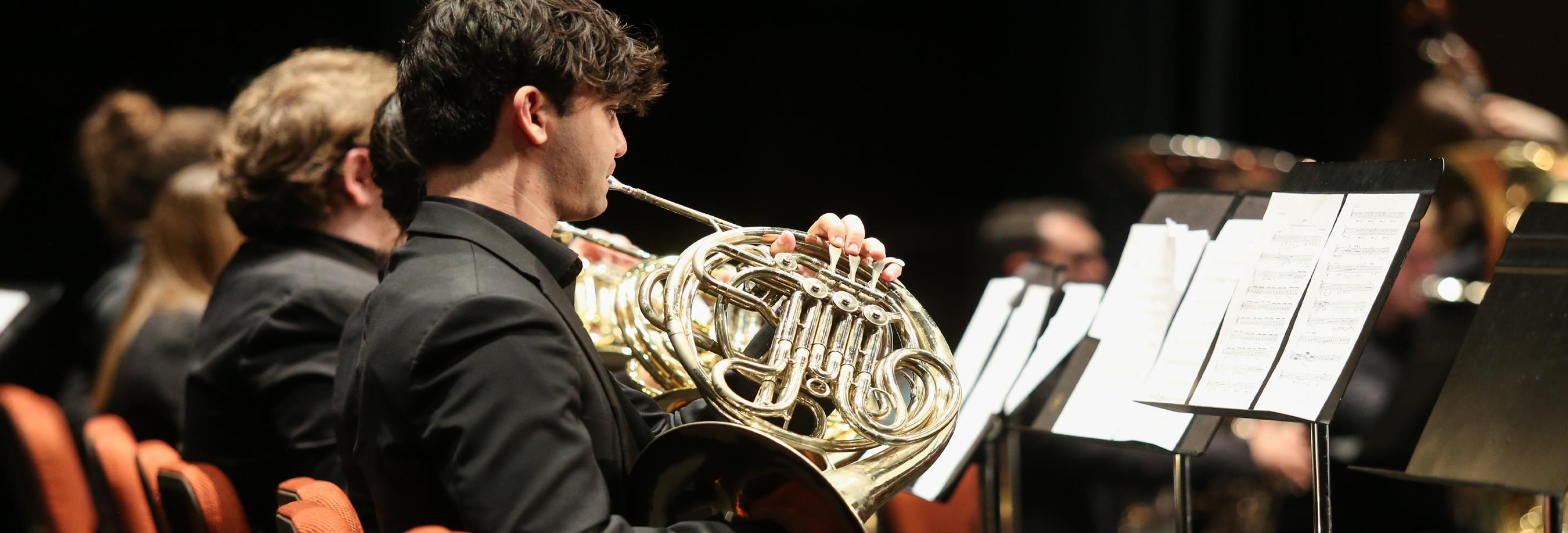



ASUMusicDanceTheatre ASU_MDT musicdancetheatre.asu.edu Music 480-965-3371 Dance and Theatre 480-965-5337
LOTUS Quartet
LOTUS Quartet is commited to delivering exceptional performances and actively engaging with the community. Since its establishment in 2022, this ensemble has earned praise for its artistic achievements and proactive involvement in the cultural landscape of the Phoenix community.
The LOTUS Quartet’s repertoire encompasses a wide array of musical styles, delighting audiences and garnering recognition from chamber music competitions. A significant milestone in their journey was achieving 1st Place in the 2023 Music Teachers National Association - National Chamber Music Competition. Recently they took second place in the Senior Division Mixed Instruemtal Category of the 2024 Coltman Competition.

Renowned for their seamless transitions across various genres, including classical, jazz, and pop, the LOTUS Quartet is dedicated to establishing deep connections with their audience. Their mission transcends mere entertainment, aiming to craft a memorable and personalized experience for all who engage with their musical endeavors. Through their artistry, the LOTUS Quartet endeavors to enhance the concert experience, leaving a lasting impact on the hearts of their listeners.
The members of the LOTUS Quartet are GianCarlo Lay, Johnathan Lee, Keegan Ewan, and Jerick Meagher, all undergraduate students under the tutelage of Christopher Creviston at Arizona State University.



ASUMusicDanceTheatre ASU_MDT musicdancetheatre.asu.edu Music 480-965-3371 Dance and Theatre 480-965-5337
Jaxon Castro

Jaxon Jordan Castro is a 21-year-old composer from Queen Creek, Arizona. After graduating from Queen Creek High School in 2020, from which he earned a Director’s Award and the Arizona State Seal of Arts Proficiency, he applied and was accepted into the Herberger Institute for Design and the Arts at Arizona State University. He writes music filled with imagery, and he aims to provide unique and enjoyable experiences for both audiences and performers.
Much of Castro’s time goes into writing music for wind band and orchestra. However, he also has written several other types of works, including a percussion ensemble, a brass quintet, a cello duet, and solo piano pieces. He composes for a wide variety of instruments and ensembles, which he attributes to having a similar wide variety of musical experience. He has been an active member of wind bands for over a decade, and also has experience in orchestra, jazz, marching band, theatre pit, and various chamber groups, to name a few.
Castro’s music focuses on bringing sonic experiences to audiences by evoking stories, images, or emotions. With heavy influence from electronic dance music (EDM), he brings together the composition of EDM with the orchestration of classical music to create his unique, contemporary style. He composes music about science, technology, video games, psychology, nature, and natural phenomena like weather, time, and outer space.
Castro is a composer, arranger, orchestrator, and producer, but also a performer and multi-instrumentalist. In addition to the horn, Jaxon plays bassoon and jazz trombone.



ASUMusicDanceTheatre ASU_MDT musicdancetheatre.asu.edu Music 480-965-3371 Dance and Theatre 480-965-5337
Composer-in-Residence
Associate Director of Bands
Jamal Duncan

Jamal Duncan joined the faculty of the School of Music, Dance and Theatre at Arizona State University in the Fall of 2020 as Associate Director of Bands and Assistant Professor of Instrumental Conducting. His primary responsibilities are conducting the Wind Symphony and teaching classes in conducting. In addition, Duncan also serves as Assistant Director of Undergraduate Studies in Music. Prior to his appointment at Arizona State University, Duncan served as the Assistant Director of Bands at the University of Arkansas in Fayetteville.
Duncan’s research interests include conducting pedagogy, wind literature, and re-defining the traditional concert experience. He has presented on these topics at various state and international conferences including the Midwest Clinic.
An ardent supporter of growing the repertoire of wind bands and chamber ensembles, Duncan has been involved in commissioning new works from Steven Bryant, Andrea Clearfield, Michael Conti, Viet Cuong, Kevin Day, John Mackey, Giovanni Santos, Alex Shapiro, Jim Territo and Dana Wilson.
A winner of the 2022 American Prize in Band/Wind Ensemble conducting, Duncan was also a a fellow at the 2021 Reynolds Conducting Institute held in conjunction with the Midwest Clinic. Duncan has conducted and adjudicated middle school, high school, and collegiate ensembles in numerous states, and internationally in Canada, England and France.
Duncan taught in the public schools of Lansing, Michigan for seven years where he was director of bands at C.W. Otto Middle School then director of bands at Dwight Rich Middle School. For eleven seasons, Duncan was the music director and conductor of the Flint Youth Wind Ensemble, one of several youth ensembles in the Flint School of Performing Arts.



ASUMusicDanceTheatre ASU_MDT musicdancetheatre.asu.edu Music 480-965-3371 Dance and Theatre 480-965-5337
A native of Flint, Michigan, Duncan received the doctor of musical arts in wind conducting and a master of music in wind conducting degrees from Michigan State University where he studied with Dr. Kevin L. Sedatole. Duncan received a bachelor of music degree from the University of Michigan with a dual emphasis in clarinet performance and music education.
He is a member of Phi Mu Alpha Sinfonia Fraternity, The National Association for Music Education, and the College Band Directors National Association. He holds honorary memberships in Kappa Kappa Psi and Tau Beta Sigma.




ASUMusicDanceTheatre ASU_MDT musicdancetheatre.asu.edu Music 480-965-3371 Dance and Theatre 480-965-5337
Director of Bands
Jason Caslor
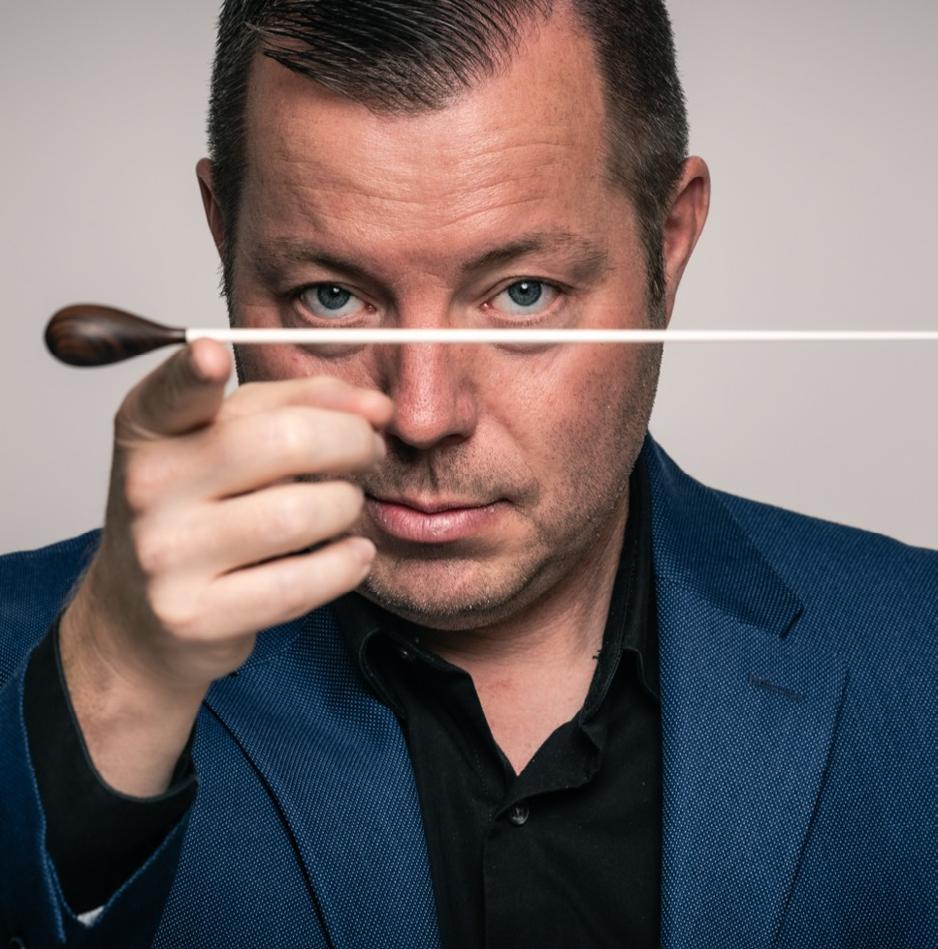
Jason Caslor was born and raised in North Battleford, Saskatchewan, Canada. Caslor is currently an Associate Professor of Music and the Director of Bands at Arizona State University (ASU). In addition to directing the Wind Ensemble, he also mentors graduate conducting students and teaches conducting courses at the graduate and undergraduate level. Recent highlights include first commercial recordings of Kevin Day’s 2022 Pulitzer Prize in Music nominated Concerto for Wind Ensemble and Carter Pann’s Double Concerto “Baroque” with the ASU Wind Ensemble.
From 2015-2019, Caslor was an Assistant Professor and the Associate Director of Bands and Orchestras at ASU. Highlights of that time include founding the now firmly established ASU Philharmonia and being nominated for ASU’s Outstanding Master’s Mentor Award. From 2010-2015, Caslor was an Assistant Professor of Instrumental Conducting at Memorial University in St. John’s, Newfoundland, Canada where he conducted the wind ensemble and oversaw the undergraduate and graduate instrumental conducting programs. Prior to that, he spent three seasons as resident conductor with the Thunder Bay Symphony Orchestra (TBSO). During his tenure with the TBSO, he conducted more than 75 concerts (including a CBC Radio national broadcast) and recorded a full-length, internationally distributed CD with Canadian blues artist Rita Chiarelli.
A Conn-Selmer Educational Clinician, Caslor has guest conducted or adjudicated in every province in Canada and throughout the United States. In addition to numerous regional engagements, Caslor has conducted the United States Army Field Band, the National Youth Band of Canada, the South Dakota All State Band, the South Dakota Intercollegiate Band, and the Alberta Wind Symphony. He also served as a conducting clinician for the inaugural CASMEC Conducting Symposium.



ASUMusicDanceTheatre ASU_MDT musicdancetheatre.asu.edu Music 480-965-3371 Dance and Theatre 480-965-5337
A fiercely proud Canadian currently living amongst cacti, Caslor’s co-founding and leadership over the Canadian Band Association’s (CBA) Howard Cable Memorial Prize in Composition lead to him being the recipient of the CBA’s 2022 International Band Award. The award recognizes those individuals who have embraced the ideals of the CBA and have contributed to the promotion, growth and development of the musical, educational and cultural values of Canadian band outside of Canada.
As a researcher, he has presented his work at the Midwest Band and Orchestra Clinic, the WASBE International Conference, the CBDNA National Conference, the IGEB International Conference on Wind Music, the International Society for Music Education World Conference, and the Riksförbundet Unga Musikanter Wind Band Symposium (Sweden). He has also published numerous articles, most prominently in the Canadian Winds journal.
Caslor completed his doctorate in conducting at Arizona State University. Prior to earning a master’s in conducting from the University of Manitoba, he earned dual bachelor’s in music and education from the University of Saskatchewan, Canada.
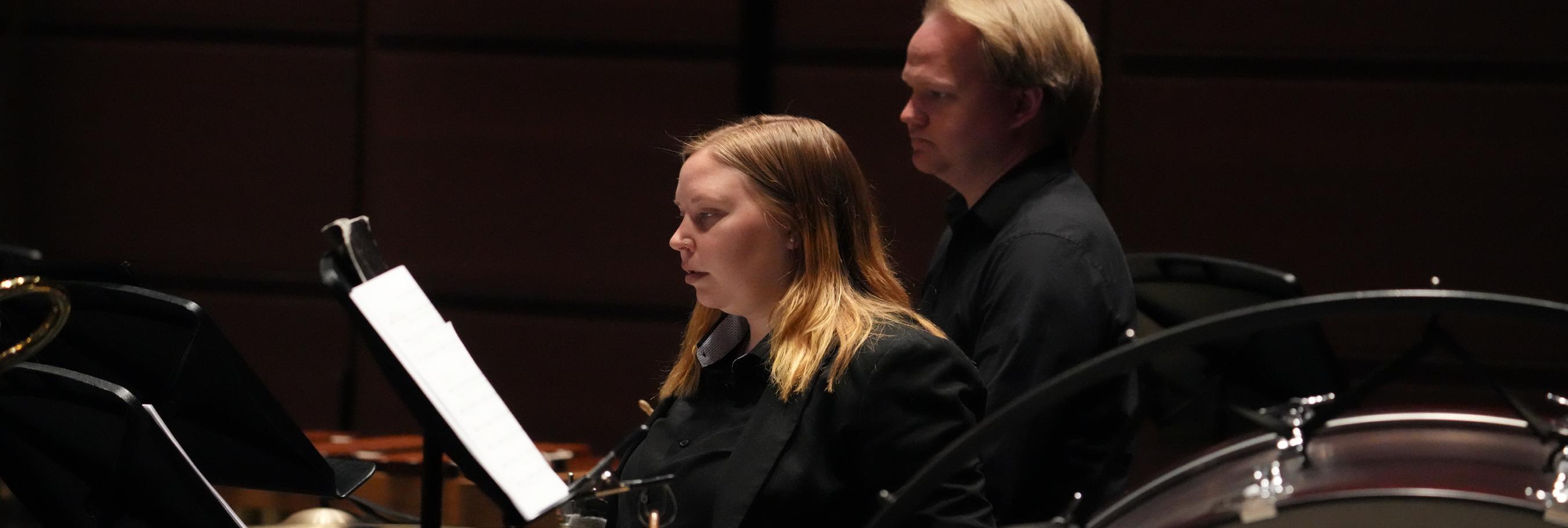



ASUMusicDanceTheatre ASU_MDT musicdancetheatre.asu.edu Music 480-965-3371 Dance and Theatre 480-965-5337
Director of Athletic Bands
James Hudson
James G. Hudson serves as the Director of Athletic Bands at Arizona State University. His duties include coordination and direction of the Sun Devil Marching Band and Athletic Bands. During his tenure with the SDMB, they have consistently been selected by the College Band Directors National Association as an exemplary collegiate program. They have performed with Tower of Power, Little Richard, OAR, and the Boston Brass and are one of two bands in the Pac 12 to have been awarded the prestigious Sudler Trophy.

Prior to his appointment at ASU, he served for three years as Director of Athletic Bands at the University of Kansas and for eleven years as Director of Bands at Southwest Texas State University (now Texas State University). While at the University of Kansas, he directed the University of Kansas Marching Jayhawks, the Volleyball and Basketball Bands, KU Jazz Ensemble II and the University Band. He also served as coordinator of the Midwest Music Camps. While at Southwest Texas, the Pride of the Hillcountry Marching Band performed internationally in Switzerland, Italy, France, and Ireland and nationally at the 1999 Bands of America Grand National Championships. The band also performed extensively in Texas for the University Interscholastic League and Bands of America. In 1995, the “Pride” was selected to appear on the Video Express production “Best of the College Bands”.
Hudson’s public-school teaching experience includes one year at Harmony Community Schools in Farmington, IA and nine years at Oskaloosa Community Schools in Oskaloosa, IA. While at Oskaloosa his band received many honors and distinctions including 4 Bands of America Summer National Class A Championships, performances at the Fiesta Bowl National Pageant of Bands and Parade, 1990 State 3-A Jazz Champions, and 1990 Iowa Bandmasters Honor Jazz Band.



ASUMusicDanceTheatre ASU_MDT musicdancetheatre.asu.edu Music 480-965-3371 Dance and Theatre 480-965-5337
His family includes his wife Denise, who is currently a Colorguard Instructor for the Sun Devil Marching Band and Gilbert High School. She has been on the instructional staff at Oskaloosa High School, the University of Nebraska-Lincoln, Southwest Texas State University, the University of Kansas, Blue Springs High School, and the Sky Ryders Winterguard. Additionally, she was co-founder of the Millennia Winterguard from Texas. They have one son, Aaron, who is a recent graduate as a History and Anthropology Major at ASU and alumni of the Colts Drum and Bugle Corps.
Mr. Hudson received a Bachelors of Music Education Degree from Northeast Missouri State University (now Truman State University) and a Masters of Music in Wind Band Conducting from the University of Nebraska at Lincoln. His professional affiliations include CBDNA, Kappa Kappa Psi, Tau Beta Sigma, Phi Mu Alpha, Phi Beta Mu, MENC, Texas Music Educators, Texas Bandmasters, Kansas Music Educators, Kansas Bandmasters, Missouri Music Educators, Missouri Bandmasters, and Iowa Bandmasters. He is a very active adjudicator, drill designer and clinician, and has adjudicated for Bands of America, Western Band Association, the University Interscholastic League (Texas), the Kentucky Music Educators Association, the Kansas Music Educators Association, the Oklahoma Bandmasters Association, the Iowa High School Music Association, and the Iowa Jazz Championships, Inc. as well as many university-sponsored festivals and contests.
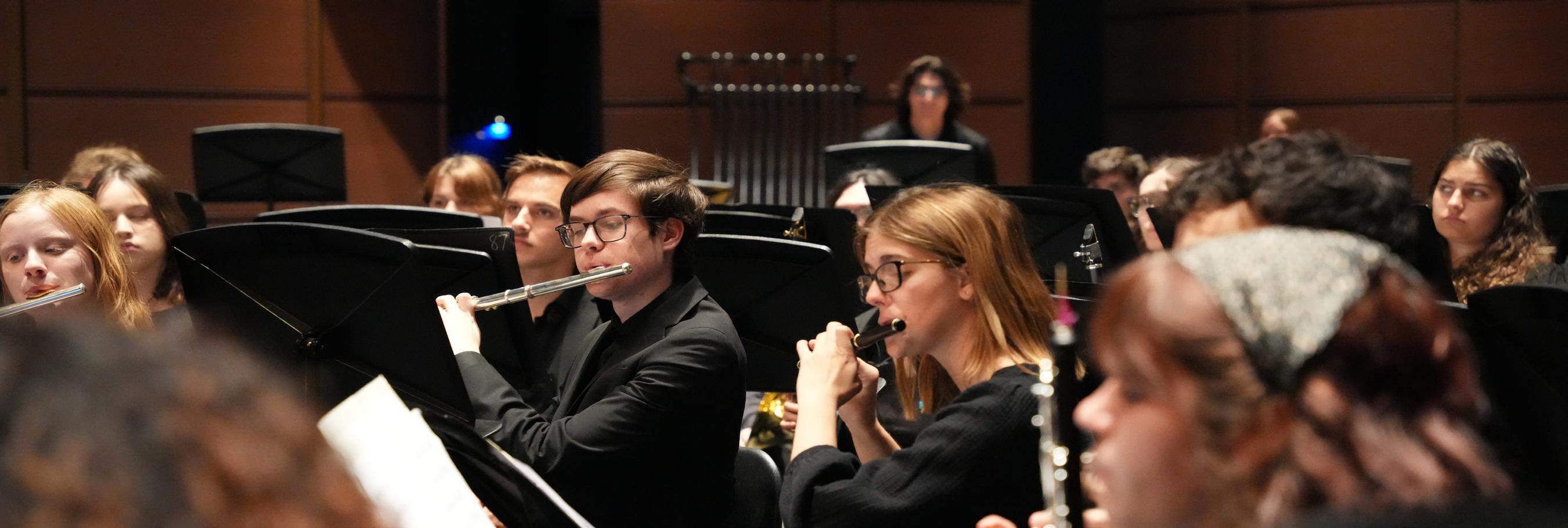



ASUMusicDanceTheatre ASU_MDT musicdancetheatre.asu.edu Music 480-965-3371 Dance and Theatre 480-965-5337
Graduate Teaching Assistant
Kevin Joseph
Kevin Joseph most recently served as the Associate Director of Bands at Basha High School in Chandler, Arizona. Joseph currently serves as an Adjunct Faculty member at Chandler Gilbert Community College and Mesa Community College as an instructor for Tuba, Low Brass, Brass Ensemble, and an Assistant Conductor of the Community Band.

Prior to his most recent appointments, Joseph served as the Director of Bands and Elective Chair at Rhodes Junior High School in Mesa, Arizona. During his tenure, Joseph oversaw a thriving band program with over 130 students.
In his pursuit to foster excellence through performance for young musicians, Joseph serves as an adjudicator for both concert and marching circuits in Arizona. Recently, he did so for the Winterguard Arizona Championship for 2022. Joseph has served on music adjudication panels for Chandler Unified School District, Mesa Public Schools and the Arizona Band and Orchestra Directors Association. Joseph currently serves on the board for Winterguard Arizona.
Joseph regularly plays Tuba with the Red Mountain Brass Quintet, Chandler Symphony, Salt River Brass, and BOOM! Percussion.
In 2017, Joseph earned his Bachelors of Music degree in Secondary Music Education from Ottawa University. He is currently pursuing a Masters in Performance (Wind Band Conducting) at Arizona State University. He is a member of National Association for Music Education, Arizona Band and Orchestra Directors Association, Arizona Music Educators Association, College Band Directors National Association, Winterguard Arizona and Winterguard International.
In quiet moments, Joseph enjoys time with his three dogs: Zeus, Apollo and Frankie. In his spare time, he can be found making dinner with his partner, watching movies about space, or practicing his avid drone hobby.



ASUMusicDanceTheatre ASU_MDT musicdancetheatre.asu.edu Music 480-965-3371 Dance and Theatre 480-965-5337
Graduate Teaching Assistant
Grant Knox
Grant Knox (he/him) is an Arizona-based music educator, conductor, and musicologist. Originally from Lexington, KY, Grant holds degrees in music education and musicology from Murray State University (BM ’18) and the University of Arizona (MM ’20). With over five years of teaching K-12 music in Kentucky and Arizona, Grant most recently served as the Director of Instrumental Music at Cienega High School in Vail, AZ, instructing all aspects of the string orchestra, concert, jazz, and athletic bands.

During his post-secondary studies, Grant entertained a diverse array of scholarly topics. Participating in multiple academic conferences and substantial research projects, Grant has presented research on Chicago hip-hop in addition to exploring racial identity in the music of Tucson-native composer Ulysses Kay. Grant continues to be passionate about amplifying the wind band works of composers from underrepresented backgrounds.
As a music educator, Grant is an advocate for healthy practices of inclusion, representation, and diversity in the music classroom/ensemble, and enjoys interdisciplinary studies of musicology, music theory, and popular music in the wind band idiom. Grant is an alumni brother of Phi Mu Alpha Sinfonia Fraternity, and an honorary member of Tau Beta Sigma National Honorary Band Sorority. He also holds active memberships in the National Association for Music Education (NAfME), Arizona Music Educator’s Association (AzMEA), and the Society for American Music (SAM).



ASUMusicDanceTheatre ASU_MDT musicdancetheatre.asu.edu Music 480-965-3371 Dance and Theatre 480-965-5337
Graduate Teaching Assistant
Anna Scott
Currently pursuing a Doctorate of Musical Arts in Wind Band Conducting from Arizona State University (ASU), Anna Scott is an active guest conductor, saxophonist, clinician, and adjudicator. Prior to arriving at ASU, Anna was the instructor of saxophone at Morningside University and was also the instrument methods instructor at Western Iowa Tech Community College.
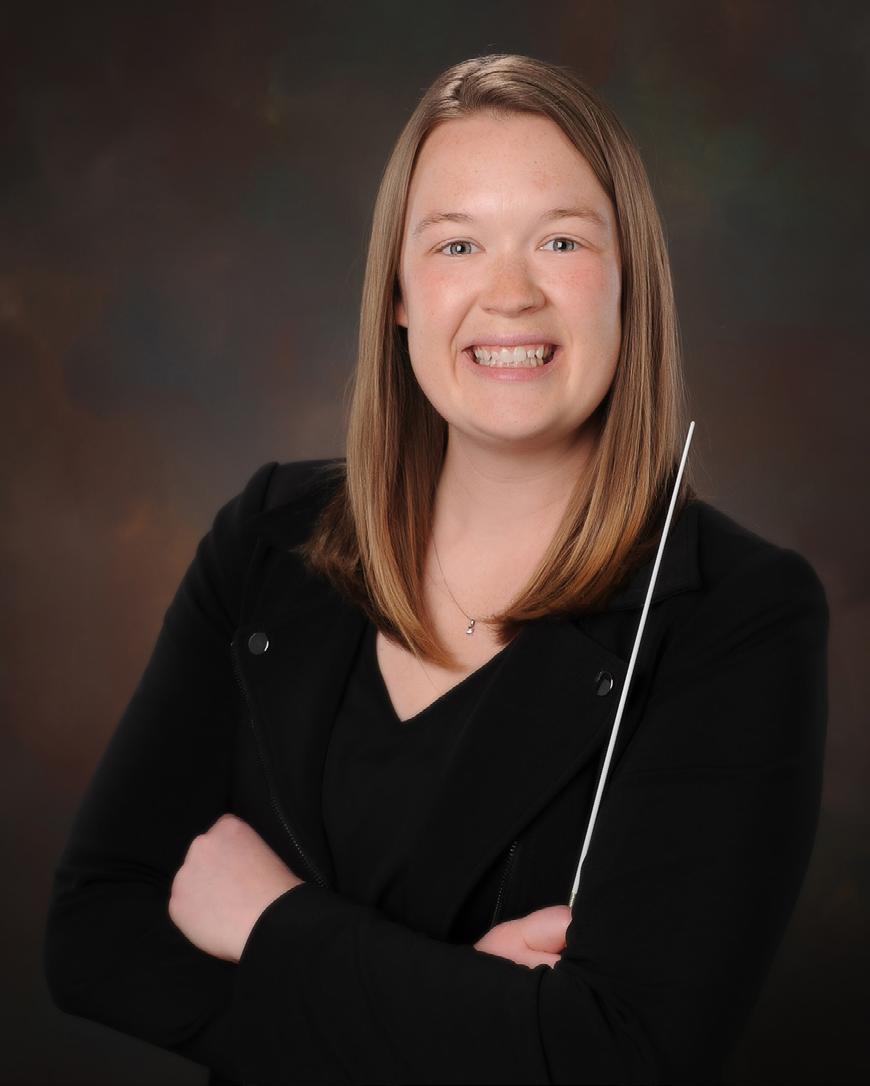
A native of Chester, South Dakota, Anna has served in the South Dakota Army National Guard since 2007. A soldier in the “Governor’s Own 147th Army Band,” Anna is currently the principal saxophonist in the concert band and tenor saxophonist in the music performance team, SGT Rock.
Increasingly in demand as an adjudicator, Anna has extensive experience as a public school music educator, having taught beginner through high school band. Under her leadership, her high school band received the 2019 Don Marcouiller Best of Class Award at the Drake University Festival of Bands. A versatile educator, Anna has worked with bands in marching, concert, and jazz settings, and adjudicated multiple solo/ensemble festivals. Guest conducting engagements have included the the AMEA Northwest All-Region Festival Band in Prescott and the Middle School All-City Honor Band in Sioux City, IA.
As a saxophonist, Anna has toured throughout the United States, performed in Suriname, South America, and was selected to perform in the “Neue Eutiner Festspiele” summer Opera Festival in Eutin, Germany. She has also shared the stage with The Temptations, was part of a world premiere performance in Carnegie Hall with the University of Kansas Wind Ensemble, and directed the show choir bands at the Grand Ole Opry in Nashville.
Anna earned her Masters of Music (Saxophone Performance) from the University of Kansas and a Bachelor of Music Education from South Dakota State University. Anna currently resides in Tempe, Arizona with her mini Goldendoodle, Rey.



ASUMusicDanceTheatre ASU_MDT musicdancetheatre.asu.edu Music 480-965-3371 Dance and Theatre 480-965-5337
ASU Wind and Percussion Faculty
Woodwinds
Elizabeth Buck, Flute
Martin Schuring, Oboe
Robert Spring, Clarinet
Joshua Gardner, Clarinet
Albie Micklich, Bassoon
Christopher Creviston, Saxophone
Brass
John Ericson, Horn
Josef Burgstaller, Trumpet
Bradley Edwards, Trombone
Deanna Swoboda, Euphonium and Tuba
Percussion
Robert Carrillo
Michael Compitello
Simone Mancuso
Matthew Prendergast
ASU Wind Bands
Faculty and Support Staff
Jason Caslor, Director of Bands
Jamal Duncan, Associate Director of Bands
James G. Hudson, Director of Athletic Bands
Kevin Joseph, Masters Teaching Assistant
Grant Knox, Doctoral Teaching Assistant
Anna Scott, Doctoral Teaching Assistant
Laura Roosen, Ensembles Office Specialist
Kevin Joseph, Head Band Librarian
Macey Campobello, Assistant Band Librarian
Heather Landes, Director, School of Music, Dance and Theatre



ASUMusicDanceTheatre ASU_MDT musicdancetheatre.asu.edu Music 480-965-3371 Dance and Theatre 480-965-5337








ASUMusicDanceTheatre ASU_MDT musicdancetheatre.asu.edu Music 480-965-3371 Dance and Theatre 480-965-5337 v Follow us on X!! @ASUwindbands Learn more musicdancetheatre.asu.edu/wind-bands Follow us on Instagram! @ASUwindbands Like what you hear? Leave us a review! facebook.com/asuwindbands Subscribe to our mailing list with this link: http://eepurl.com/gIIYm9 or the QR code:
Support Our Students
If you are a friend of the ASU Wind Bands and are looking for more ways to be involved and help support students, please consider making a donation. Your financial support directly benefits the student experience through scholarships, interaction with world-class guest artists, commissions for new works and traveling for competitions and performances.

Donate
Please visit the ASU Foundation to donate to ASU Wind Bands. For any questions about helping the ASU Wind Bands, please contact Director of Bands Jason Caslor at jcaslor@asu.edu
All funds will be deposited with the ASU Foundation, a separate non-profit organization that exists to support ASU. Due to the value of benefits received, only payment in excess of Fair Market Value may be considered a charitable contribution. Please consult with your tax advisor regarding the deductibility of charitable contributions. Benefits may be available only upon your request, at your expense (if any) and subject to availability. Benefits are effective immediately and are subject to change without notice.



ASUMusicDanceTheatre ASU_MDT musicdancetheatre.asu.edu Music 480-965-3371 Dance and Theatre 480-965-5337
































